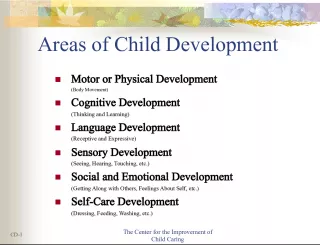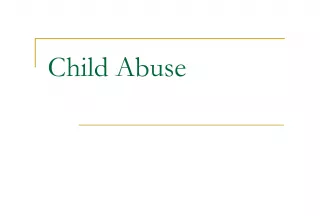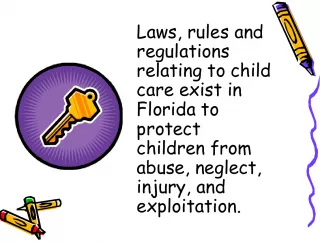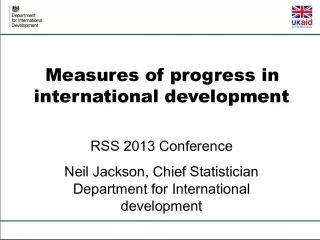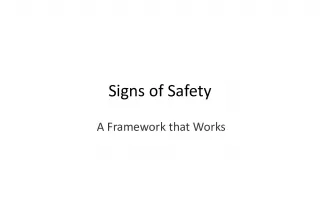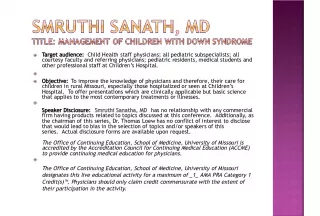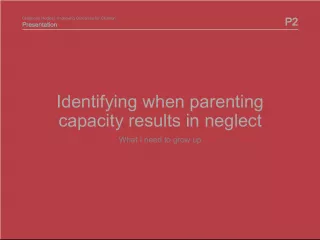Child Development Notes are Grey and BOLD Introduction
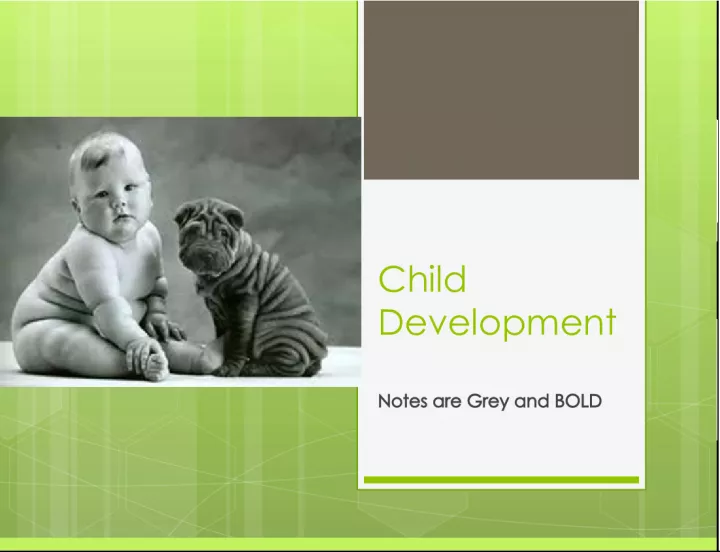

Child Development Notes are Grey and BOLD Introduction to Developmental Psychology True False If a mother drinks heavily during pregnancy
- Uploaded on | 0 Views
-
 laya
laya
About Child Development Notes are Grey and BOLD Introduction
PowerPoint presentation about 'Child Development Notes are Grey and BOLD Introduction'. This presentation describes the topic on Child Development Notes are Grey and BOLD Introduction to Developmental Psychology True False If a mother drinks heavily during pregnancy. The key topics included in this slideshow are 20004355,20004355,,,0,0,. Download this presentation absolutely free.
Presentation Transcript
1. Child Development Notes are Grey and BOLD
2. Introduction to Developmental Psychology (True/False) 1.If a mother drinks heavily during pregnancy her baby will have mental difficulties. 2.Newborns see only a blur of meaningless light and dark shades. 3.before age 2 infants cannot think. 4.Most abusive parents were themselves abused or neglected as children. 5.The first 2 years of life provide a good basis for predicting a persons eventual personality traits. 6.A heartbeat can be detected as early as 8 weeks into pregnancy. 7. Memories before age 5 are formulated differently, making them almost impossible to remember as adults. 8. A young child often believes that the sun rises in the morning to wake her up.
3. Introduction to Developmental Psychology (True/ False) 1. If a mother drinks heavily during pregnancy her baby will have mental difficulties. 2. Newborns see only a blur of meaningless light and dark shades. 3. before age 2 infants cannot think. 4. Most abusive parents were themselves abused or neglected as children. 5. The first 2 years of life provide a good basis for predicting a persons eventual personality traits. 6. A heartbeat can be detected as early as 8 weeks into pregnancy. 7. Memories before age 5 are formulated differently, making them almost impossible to remember as adults. 8. A young child often believes that the sun rises in the morning to wake her up. 1. T 2. F 3. F 4. T 5. T 6. T 7. T 8. T
4. There is much research that supports the idea that the nine months of gestation constitute the most consequential period of our lives, permanently influencing the wiring of the brain and the functioning of organs such as the heart, liver and pancreas. The conditions we encounter in utero, shape our susceptibility to disease, our appetite and metabolism, our intelligence and some researchers say, even temperament. Listening to classical music has never been proven to have an affect on the baby
5. Evidence indicates, for example, that pregnant women subjected to starvation or extreme stress give birth to children with a higher risk of schizophrenia. A study of the health records of more than 88,000 people born in Jerusalem between 1964 and 1976 found that the offspring of women who were in their second month of pregnancy in June 1967 the time of the Arab-Israeli Six-Day War were significantly more likely to develop schizophrenia as young adults, regardless of the environment in which they were raised.
6. Some Surprising Research: As if overturning the common conception of infancy weren't enough, scientists are creating a startling new picture of intelligent life in the womb. Among the revelations: By nine weeks, a developing fetus can hiccup and react to loud noises. By the end of the second trimester (20 weeks) it can hear. Just as adults do, in the 3 rd trimester, the fetus experiences REM sleep indicating the ability to dream. The fetus savors its mother's meals, first picking up the food tastes of a culture in the womb. "During the last trimester, the fetus is swallowing up to a liter a day" of amniotic fluid, notes Julie Mennella, a biopsychologist at the Monell Chemical Senses Center in Philadelphia. She thinks the fluid may act as a "flavor bridge" to breast milk, which also carries food flavors from the mother's diet.
7. Among other mental feats, the fetus can distinguish between the voice of Mom, Dad or close relative, and that of a stranger, and respond to a familiar story read to it. Even a premature baby is aware, feels, responds, and adapts to its environment By monitoring changes in fetal heart rate, psychologist JeanPierre Lecanuet and his colleagues in Paris have found that fetuses seem to like certain stories more than others. The fetal heartbeat will slow down when a familiar French fairy tale such as "La Poulette" ("The Chick") or "Le Petit Crapaud" ("The Little Toad") is read near the mother's belly. When the same reader delivers another unfamiliar story, the fetal heartbeat stays steady.
8. The Importance of the Prenatal Environment "Behavior doesn't begin at birth," declares DiPietro. "It begins before and develops in predictable ways." One of the most important influences on development is the fetal environment. As Harvard's Als observes, "The fetus gets an enormous amount of 'hormonal bathing' through the mother, so its chronobiological rhythms are influenced by the mother's sleep/wake cycles, her eating patterns, her movements."
9. So Parents-to-be who want to further their unborn child's mental development should start by assuring that the prenatal environment is well nourished, low-stress, drug and toxin free.
10. The effects of alcohol on a developing brain are even more dramatic than stress. If you are pregnant- dont drink.
11. The main brain areas affected by alcohol consumption: Frontal Lobes - this area controls impulses and judgment. The most noteworthy damage to the brain probably occurs in the prefrontal cortex, which controls Executive Functions. Corpus Callosum - passes information from the left brain (rules, logic) to the right brain (impulse, feelings) and vice versa. The Corpus Callosum in an individual with FAS/ARND might be smaller than normal, and in some cases it is almost nonexistent. (MRI images) Hippocampus - plays a fundamental role in memory, learning, and emotion. Hypothalamus - controls appetite, emotions, temperature, and pain sensation
12. One of Canada's leading researchers, Dr. Christine Loock, estimates that at least one in every four inmates in federal institutions have FAS.
13. How do you think we should be dealing with people who have FAS and commit crimes?
14. Infant and Child Development
15. What is your first memory? Can you remember your first birthday party? Do you remember wearing diapers or learning how to crawl?
16. Most people cant remember much before about the age of 3, and we remember little from ages 3-5 because we did not have the neural connections in our brains that allow us to remember. BIRTH 6 MONTHS 2 YEARS
17. Our memories still function when we are really young, they just work differently than we are older.
18. How does our thinking develop? Can you guess at what age children do each of the following? 1. Laugh 2. Pedal a tricycle 3. Sit without support 4. Feel ashamed 5. Walk 6. Recognize and smile at mom or dad 7. Understand higher order concepts ie: Peace 8. Make 2 word sentences
19. 1. Laugh (2 months) 2. Pedal a tricycle (2 years) 3. Sit without support (5-6 months) 4. Feel ashamed (2 years) 5. Walk (1 year) 6. Recognize (first weeks)and smile purposefully at mom or dad (3-4 months) 7. Understand higher order concepts ie: Peace(10 years) 8. Make 2 word sentences (20-22 months)
20. How does our thinking develop? Jean Piaget :1896- 1980 Famous developmental psychologist Named one of Time magazines 100 most important people of the 20 th century
21. Work sheet on Piaget and cognitive development p.266-271
22. Social development in Infancy and Childhood.
